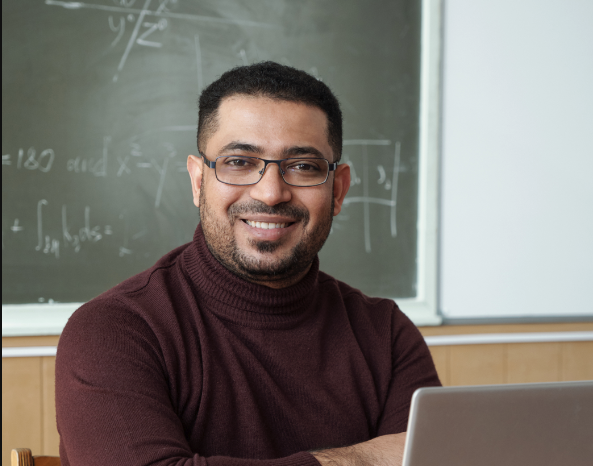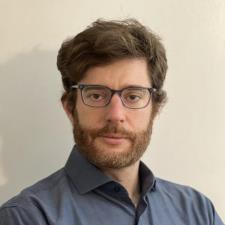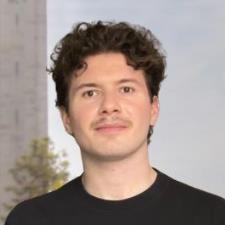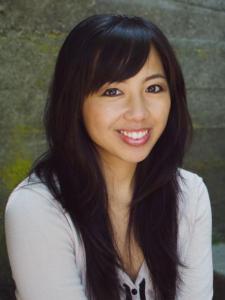











More than 4 million 5-star reviews
65,000 expert tutors in 300+ subjects
Find a great match with our Good Fit Guarantee
More than 4 million 5-star reviews
65,000 expert tutors in 300+ subjects
Find a great match with our Good Fit Guarantee
Featured by the nation’s most respected news sources
Tutors from top universities
Meet 1:1 at home or nearby
The Best Tutors in Los Angeles, CA
Find the best local tutor in Los Angeles

Los Angeles, CA
Experienced Adobe Software Trainer
I have over 25 years of teaching and training Adobe software courses at various colleges in California. I attended LACC, Cal State Northridge, and UCLA school of Design. I teach all levels of adult students from beginners to professionals. I am...
I have over 25 years of teaching and training Adobe software courses at various colleges in California. I attended LACC, Cal State Northridge, and UCLA school of Design. I teach all levels of adult students from beginners to professionals. I am...

Los Angeles, CA
Expert Chemistry - Physics Educator|UCLA PhD|12+ yrs Experienced|
I am a dedicated and passionate Science Educator with over 10 years of experience, specializing in Chemistry and Physics at both high school and college levels. I hold a Masters and a PhD in Engineering from UCLA, where I also developed a patented...
I am a dedicated and passionate Science Educator with over 10 years of experience, specializing in Chemistry and Physics at both high school and college levels. I hold a Masters and a PhD in Engineering from UCLA, where I also developed a patented...
My son jumped up after the lesson and said Dr. DJ is the best teacher ever! He said he feels like he could learn any subject from Dr. DJ. My son was worrying about his AP Chemistry exam, and after this lesson his confidence seems ... - Laurie, 3 lessons with Dr. DJ

Los Angeles, CA
Expert Ivy/Top-Tier College Essay Coach, English PhD, Former UCLA Prof
College essays are a crucial part of the application process. They are your opportunity to make a lasting impression on admission committees, and to distinguish yourself from other applicants through creative, skillfully written, and memorable...
College essays are a crucial part of the application process. They are your opportunity to make a lasting impression on admission committees, and to distinguish yourself from other applicants through creative, skillfully written, and memorable...
I cannot recommend Gabriel highly enough to anyone looking for a college essay tutor who truly understands storytelling, admissions strategy, and the human side of this process. In just a few days, amidst an impending deadline, he... - Rummana, 7 lessons with Gabriel

Los Angeles, CA
Award Winning Composer, Pianist, Educator - Jazz and Classical
I am a professional composer, pianist, and educator that has 14 years of teaching experience. My private students went to win International Competitions and performed in Carnegie Hall. My number one job is to make sure that you see and believe...
I am a professional composer, pianist, and educator that has 14 years of teaching experience. My private students went to win International Competitions and performed in Carnegie Hall. My number one job is to make sure that you see and believe...
I've always been disappointed and frustrated with piano teachers, no connection, no direction and promises that couldn't be fulfilled. Yakub understood every idea and direction I wanted to take. He relates and knows so many aspect... - Notion, 4 lessons with Yakub

Los Angeles, CA
Learn From a Renowned Film Composer!
Reuven is a working film composer in Los Angeles, California. He is a composer, orchestrator, and arranger of original scores for numerous independent films and has written additional music for Hollywood productions like Star Wars: Rebels, Star...
Reuven is a working film composer in Los Angeles, California. He is a composer, orchestrator, and arranger of original scores for numerous independent films and has written additional music for Hollywood productions like Star Wars: Rebels, Star...

Los Angeles, CA
Design and Spanish Tutor
Hi! I’m Satya, an Industrial Designer based in Los Angeles. I’m passionate about design and teaching, especially when it comes to helping others grow in design or learn Spanish. I have a bachelor's degree in Industrial Design and have over...
Hi! I’m Satya, an Industrial Designer based in Los Angeles. I’m passionate about design and teaching, especially when it comes to helping others grow in design or learn Spanish. I have a bachelor's degree in Industrial Design and have over...
Satya worked with us on Adobe Illustrator, InDesign, Figma, and Photoshop. She is highly proficient in the software knowing both menu and shortcuts, but is also great with suggesting design. She is patient and was great with getti... - Rita, 25 lessons with Satya

Los Angeles, CA
20 yrs tutoring experience, published author of Kaplan test prep book
Hi! I'm Harmony. I have been tutoring since my days at Phillips Exeter Academy, and I hold a chemistry and French degree from UC Berkeley. Students get so much more than subject learning with me. Yes, their grades often end up in the A range, no...
Hi! I'm Harmony. I have been tutoring since my days at Phillips Exeter Academy, and I hold a chemistry and French degree from UC Berkeley. Students get so much more than subject learning with me. Yes, their grades often end up in the A range, no...

Los Angeles, CA
Students Get 510+!|Average 7+ Pt. Increase|96%-ile MD/JD/MBA|Radiology
Hello! I am a 4th year medical student and rising Interventional Radiology resident. I am a graduate of the Ohio State University and an MD/JD/MBA candidate in Southern California. I have presented at multiple research conferences during my...
Hello! I am a 4th year medical student and rising Interventional Radiology resident. I am a graduate of the Ohio State University and an MD/JD/MBA candidate in Southern California. I have presented at multiple research conferences during my...
Let me start with the main point of this review: Kendall is an AMAZING CARS tutor for the MCAT. Before I met Kendall, my CARS section test scores were around 123-124. After just one lesson with Kendall my score immediately went ... - Nicholas, 5 lessons with KENDALL

Los Angeles, CA
UChicago graduate with 6+ years of tutoring experience
I am a University of Chicago graduate, holding a Magna Cum Laude bachelor’s degree in economics. My education was highly quantitative in nature, but I have explored the humanities, social sciences, and physical sciences in depth; this enables a...
I am a University of Chicago graduate, holding a Magna Cum Laude bachelor’s degree in economics. My education was highly quantitative in nature, but I have explored the humanities, social sciences, and physical sciences in depth; this enables a...

Los Angeles, CA
Saxophone, Music Theory, Music History
At Eastman School of Music (B.M.), I received extensive training in saxophone performance, music theory, and music history. While attending the elite Frost School of Music at the University of Miami (M.M.), I honed my jazz performance skills with...
At Eastman School of Music (B.M.), I received extensive training in saxophone performance, music theory, and music history. While attending the elite Frost School of Music at the University of Miami (M.M.), I honed my jazz performance skills with...

Los Angeles, CA
Former Facebook Developer Tutoring Coding and Computer Science
I am a self taught software developer who prides himself on adapting quickly to industry trends. I currently work at a major e-commerce retailer as an AWS/React engineer. In the past I have worked contracts at Facebook/Meta, Viking Cruises, and...
I am a self taught software developer who prides himself on adapting quickly to industry trends. I currently work at a major e-commerce retailer as an AWS/React engineer. In the past I have worked contracts at Facebook/Meta, Viking Cruises, and...

Los Angeles, CA
PhD Expert in Music Theory, Ear Training, Ableton, Mix/Master, Piano
I hold a PhD in Music Theory from the renowned Eastman School of Music. I have hundreds of hours of music theory teaching experience (150+ students taught), in large and small classrooms, Zoom, and private tutoring. I have three degrees in Music...
I hold a PhD in Music Theory from the renowned Eastman School of Music. I have hundreds of hours of music theory teaching experience (150+ students taught), in large and small classrooms, Zoom, and private tutoring. I have three degrees in Music...
Ethan is one of the best tutors I have had throughout all of my education. He is extremely patient, knowledgeable, and a true example of what every educator should be like. He went through and helped me with all the concepts I did... - Scott

Los Angeles, CA
Stanford Grad & Alum Interviewer/Top College Essay and Admissions
Greetings! My name is Lisa, and I am here to help you craft the most compelling college essay possible so you can achieve your college admissions goals. I have personally interviewed dozens of students for Stanford so I know what makes an...
Greetings! My name is Lisa, and I am here to help you craft the most compelling college essay possible so you can achieve your college admissions goals. I have personally interviewed dozens of students for Stanford so I know what makes an...

Los Angeles, CA
Voice/Piano: Industry Professional with Touring and Studio Experience
All levels welcome for lessons in voice and piano from a professional singer/songwriter/recording artist with 15+ years of experience. I have a Bachelor of Arts degree in Music Business from Anderson University (Anderson, Indiana) where I...
All levels welcome for lessons in voice and piano from a professional singer/songwriter/recording artist with 15+ years of experience. I have a Bachelor of Arts degree in Music Business from Anderson University (Anderson, Indiana) where I...

Los Angeles, CA
College Application Essay Coach - Brown University Writing Fellow
I specialize in helping students craft compelling college essays to set their applications apart. College essays offer a unique opportunity to speak directly to admissions officers, and I guide students through every stage of the process - from...
I specialize in helping students craft compelling college essays to set their applications apart. College essays offer a unique opportunity to speak directly to admissions officers, and I guide students through every stage of the process - from...
Alexandra helped me with my college essay and numerous supplemental essays. I loved working with her because she made the long and challenging process easy and manageable. Her dedication and patience helped me infuse my voice in... - Adam, 38 lessons with Alexandra

Los Angeles, CA
ADHD Coach and English Tutor
Hello! My name is Miss Jenn. I am a certified ADHD coach and an English tutor. I have been tutoring personally and professionally for 30 years. I have been a teacher for 6 years. I have taught online, in private sessions, and in a classroom....
Hello! My name is Miss Jenn. I am a certified ADHD coach and an English tutor. I have been tutoring personally and professionally for 30 years. I have been a teacher for 6 years. I have taught online, in private sessions, and in a classroom....
My son rarely gives positive feedback on teachers however he said Jennifer was really nice and personable, knows her stuff, and wasn’t boring/dry like other English tutors can be. That’s splendid for us as he is looking forward to... - Tsiliana, 8 lessons with Jennifer

Los Angeles, CA
GMAT Focus / EA Expert: 20 yrs exp, led company curriculum, 790 score
I've been teaching students the skills and confidence to succeed on the GMAT since 2003, and recently published a book, The GMAT Mentor, for the GMAT Focus Edition. In addition to teaching, I led curriculum creation for a major test prep company,...
I've been teaching students the skills and confidence to succeed on the GMAT since 2003, and recently published a book, The GMAT Mentor, for the GMAT Focus Edition. In addition to teaching, I led curriculum creation for a major test prep company,...
I highly recommend working with Mark to improve your GMAT Focus score. He is extremely knowledgeable and patient, and he tailored each lesson and study plan to match my specific strengths and weaknesses. Mark emphasizes building a... - James, 13 lessons with Mark

Los Angeles, CA
Expert History Teacher: AP European, AP United States and AP World.
Hi, my name is Steve. I have a passion for helping high school students understand AP history! For the past 23 years I have taught APUSH, AP Euro and AP World history courses to thousands of students who have had remarkable success. I hold...
Hi, my name is Steve. I have a passion for helping high school students understand AP history! For the past 23 years I have taught APUSH, AP Euro and AP World history courses to thousands of students who have had remarkable success. I hold...

Los Angeles, CA
TEST PREP & ESSAY SPECIALIST with a PhD
Having completed my PhD, I have succeeded at every level of academic achievement; with almost 20 years of teaching experience, I can help your child do the same. My focus is on helping your student ace his or her life changing tests! It's...
Having completed my PhD, I have succeeded at every level of academic achievement; with almost 20 years of teaching experience, I can help your child do the same. My focus is on helping your student ace his or her life changing tests! It's...
My daughter worked with James for about a month prior to taking the ACT. He helped her prioritize the areas where she could make the most impact with her scores. She scored a 34 overall and a perfect 35 on math. James also help... - Amy, 6 lessons with James

Los Angeles, CA
Experienced Korean/English Tutor, who is also a filmmaker!
Hello! I’ve had many outstanding opportunities to either tutor individually or teach at academic organizations, and I really enjoy working with students. Having studied in both Korea and the United States, I have a unique perspective and deep...
Hello! I’ve had many outstanding opportunities to either tutor individually or teach at academic organizations, and I really enjoy working with students. Having studied in both Korea and the United States, I have a unique perspective and deep...
My son came away from the first session feeling really good about working with Christine. His confidence seemed boosted and the support from Christine made things click. - Andrea, 23 lessons with Christine

Los Angeles, CA
College essay specialist, UCLA grad
I'm Jakob, a graduate from UCLA with a BA with highest honors in History and Political Science and a current JD candidate at Berkeley Law School. Over five years of coaching students applying for undergraduate and professional graduate programs,...
I'm Jakob, a graduate from UCLA with a BA with highest honors in History and Political Science and a current JD candidate at Berkeley Law School. Over five years of coaching students applying for undergraduate and professional graduate programs,...
Very helpful and patient tutor. Gave very useful advice on how to make my admission essays more personal and compelling. Provided helpful and constructive feedback. Highly recommend! - Aleksandra, 8 lessons with Jakob

Los Angeles, CA
Experienced Japanese and ESL teacher
I have a Master's degree in TESL (Teaching English as a Second Language) as well as a teaching credential for Japanese language. I had taught Japanese at high schools and colleges in Orange county and ESL at adult schools in Los Angeles for over...
I have a Master's degree in TESL (Teaching English as a Second Language) as well as a teaching credential for Japanese language. I had taught Japanese at high schools and colleges in Orange county and ESL at adult schools in Los Angeles for over...
Starting out from Zero knowledge in Japanese, Hiro has taught me in a very short time a basic understanding, vocabulary, ground rules. I learned so much more than I thought I would be able to. I look forward to learning more with ... - Margreth, 35 lessons with Hiro

Los Angeles, CA
University Trained Jazz Guitar Player and Composer
I am a university trained jazz guitar player and composer with a Master's Degree in Jazz Guitar Performance and Composition. I can teach and tutor on guitar and improvised music techniques as well as orchestration and soundtrack writing. I have...
I am a university trained jazz guitar player and composer with a Master's Degree in Jazz Guitar Performance and Composition. I can teach and tutor on guitar and improvised music techniques as well as orchestration and soundtrack writing. I have...

Los Angeles, CA
UC Berkeley Grad - EXPERT SAT & COLLEGE ADMISSIONS ESSAY COACH
*Limited spots for 2025 college admissions cycle!* Congratulations to my students who've been accepted to UC Berkeley, UCLA, Yale, NYU, Syracuse, Notre Dame, Loyola Chicago, Villanova, Boston University, University of Utah, Cal Poly SLO, and...
*Limited spots for 2025 college admissions cycle!* Congratulations to my students who've been accepted to UC Berkeley, UCLA, Yale, NYU, Syracuse, Notre Dame, Loyola Chicago, Villanova, Boston University, University of Utah, Cal Poly SLO, and...
Mel has the ability to observe and focus on the study habits of our child and adjust her strategies accordingly. A great tutor with patience, diligence, promptness, thoroughness and trustworthiness above and beyond any duty or co... - Anonymous, 6 lessons with Mel

Los Angeles, CA
Homework/Writing Help from Native English Speaker
I am a patient person who likes to get results. You will benefit from my writing and analytical skills that I have acquired during a long career in government and the private sector. Specifically, I have been a manager with significant editing...
I am a patient person who likes to get results. You will benefit from my writing and analytical skills that I have acquired during a long career in government and the private sector. Specifically, I have been a manager with significant editing...
"Ray provided me with exceptional guidance and simplified every obstacle I encountered during my assignments. He was extremely supportive and instilled a great sense of accomplishment in my work. I highly recommend his services to... - Lina , 8 lessons with Ray
Los Angeles Tutors Cost $35 - 65 per hour on average
What’s a fair price for a private Los Angeles tutor? Los Angeles tutors using Wyzant are professional subject experts who set their own price based on their demand and skill.
Compare tutor costs. With a range of price options, there’s a tutor for every budget.
Sign up, search, and message with expert tutors free of charge.
Only pay for the time you need. Whether it’s one lesson or seven, you decide what to spend.
Love Your Lesson Or It’s Free
Your first hour with a new tutor is protected by Wyzant’s Good Fit Guarantee. If you’re not satisfied with your lesson, you don’t pay. No questions asked.Reported on by leading news outlets



Tutors in Los Angeles, CA
On this page, you can find local tutors in Los Angeles, CA, who can provide personalized help for a wide range of subjects and skills. Whether you're looking for ongoing support or one-time assistance, Wyzant connects you with experienced educators in your area.
Tutors help students of all ages learn effectively, build confidence, and reach their academic goals. You can choose instructors for math, science, writing, languages, test prep, or other subjects, and schedule lessons at times that work for you.
Wyzant makes learning accessible and affordable by providing flexible, one-on-one tutoring. Connect with local educators and start building skills you can apply across all areas of life.
Private Tutors in Los Angeles
Your Los Angeles private tutoring options may be numerous, but don't you want to take 1 on 1 lessons with the very best tutors in Los Angeles? We have the largest network of qualified private tutors, so students can choose their ideal tutor (and rates) from the best of the best. With Wyzant, you can find local tutors for over 250 subjects, including:
Los Angeles Chemistry Tutors | Los Angeles SAT Tutors | Los Angeles College Essay Tutors | Los Angeles Statistics Tutors | Los Angeles AP Physics Tutors | Los Angeles Law Tutors | Los Angeles Organic Chemistry Tutors | Los Angeles Chess Lessons | Los Angeles Accounting Tutors | Los Angeles Physics Tutors | Los Angeles Series 7 Tutors | Los Angeles English Tutors | Los Angeles Spanish Tutors | Los Angeles Microsoft Excel Tutors | Los Angeles AP Chemistry Tutors | Los Angeles GED Tutors | Los Angeles ISEE Tutors | Los Angeles Corporate Finance Tutors
Tutoring Near Los Angeles
If you don’t live in the center of Los Angeles, we do have local tutors in areas that may be closer to you, conveniently available for private 1:1 lessons at attractive rates. Compare reviews and qualifications and reach out to a tutor in your metro ASAP.
Long Beach Tutors | Van Nuys Tutors | North Hollywood Tutors | La Puente Tutors | Glendale Tutors | Whittier Tutors | Lakewood Tutors | Torrance Tutors | Pasadena Tutors | Northridge Tutors | Inglewood Tutors | Fullerton Tutors | El Monte Tutors | Compton Tutors | Commerce Tutors | West Hollywood Tutors | Carson Tutors | Sherman Oaks Tutors | Encino Tutors | Downey Tutors | West Covina Tutors | Burbank Tutors | Norwalk Tutors | Tarzana Tutors | Bell Tutors | Buena Park Tutors | Hawthorne Tutors | South Gate Tutors
Get Help in Your Neighborhood
Your perfect face to face tutor might be just around the corner from your home, browse our list of tutors in your neighborhood. Whether you need to hire a private coach or get help studying for exams, find one on one instruction today!
Koreatown Tutors | Westwood Tutors | Brentwood Tutors | Santa Monica Tutors | Manhattan Beach Tutors
Find Private Lessons Near Your Local School
Learn where you live. Find tutoring that is close to the classroom or campus that matters to you. Compare pricing and read thousands of reviews from students and parents like you. Make the grade when you hire a personal tutor on Wyzant’s marketplace.
Julia Ann Singer Therapeutic School Tutors | Southwestern Law School Tutors
Find online tutors
Get help anytime! We only accept the best online tutors into our community. Get the help you need, right when you need it with the convenience of online lessons.

